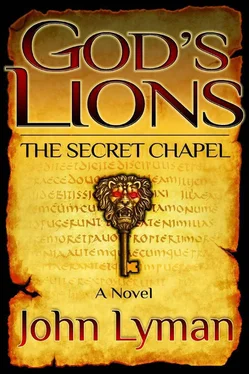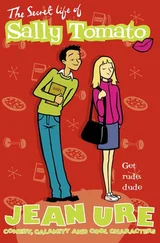John Lyman - The Secret Chapel
Здесь есть возможность читать онлайн «John Lyman - The Secret Chapel» весь текст электронной книги совершенно бесплатно (целиком полную версию без сокращений). В некоторых случаях можно слушать аудио, скачать через торрент в формате fb2 и присутствует краткое содержание. Жанр: Прочие приключения, на английском языке. Описание произведения, (предисловие) а так же отзывы посетителей доступны на портале библиотеки ЛибКат.
- Название:The Secret Chapel
- Автор:
- Жанр:
- Год:неизвестен
- ISBN:нет данных
- Рейтинг книги:3 / 5. Голосов: 1
-
Избранное:Добавить в избранное
- Отзывы:
-
Ваша оценка:
- 60
- 1
- 2
- 3
- 4
- 5
The Secret Chapel: краткое содержание, описание и аннотация
Предлагаем к чтению аннотацию, описание, краткое содержание или предисловие (зависит от того, что написал сам автор книги «The Secret Chapel»). Если вы не нашли необходимую информацию о книге — напишите в комментариях, мы постараемся отыскать её.
The Secret Chapel — читать онлайн бесплатно полную книгу (весь текст) целиком
Ниже представлен текст книги, разбитый по страницам. Система сохранения места последней прочитанной страницы, позволяет с удобством читать онлайн бесплатно книгу «The Secret Chapel», без необходимости каждый раз заново искать на чём Вы остановились. Поставьте закладку, и сможете в любой момент перейти на страницу, на которой закончили чтение.
Интервал:
Закладка:
There was no hint of a mall or chain store here, although in truth, Rome had been home to the first shopping mall in history. Leo remembered the first time he had seen it. Named after its creator, Trajan’s Markets was built in the second century AD by Emperor Trajan and his architect, Apollodorus of Damascus. Together they had built a visionary multistory complex of one hundred and fifty shops, the ancient Roman equivalent of a modern shopping mall. Everything an ancient Roman might want could be found there. The shops sold everything from silks and spices imported from the Middle East to fresh fruit, fish, and flowers. Considered among the wonders of the Classical world, this archeological treasure remains standing today in the Forum area of Rome.
Leo thought back to when America had been a country of small shopkeepers, and the change he had seen over the span of a single generation was not pleasant in his mind. The Italians had their small stores and neighborhoods, with extended generational families kept intact in the same town or village, while America’s families had undergone an enormous change in the moral and corporate explosion that now forced them to endure a commercial landscape run by powerful conglomerates.
The unique charm that had once marked the boundaries of different cultural regions throughout America was being erased, and almost every city and town across the country now resembled every other city and town from one coast to the other. Due to corporate greed, huge box stores covered the land with no respect for individual communities, forcing small family-run businesses to fail and dispersing young people to seek work hundreds or thousands of miles away from their parents and grandparents.
The change had left a barren expanse of sameness and apathy across the nation. The distancing from past values, coupled with dwindling opportunity for working men and women spurred by globalization, unaffordable college tuition, and the widening gap between the very rich and everyone else, was creating a violent underclass that was spreading like a virus across a land previously occupied by a mostly peaceful and moral populace.
Who or what had ushered in this new age was a subject of much debate at the university where Leo taught. He had formed a theory that the Great Depression had so victimized our “greatest generation” that they had unwittingly sowed the seeds for a selfish, winner-take-all postwar grab for material wealth. Their efforts to raise themselves out of poverty and give their children a better life had changed the very core values of an America they had worked so hard to create and left the generations that followed without a unifying sense of community.
In the wake of the country’s newfound wealth, a religion of consumerism had spurred a mindless pursuit for greater corporate profits. This greed-fueled race eventually led to companies sending millions of manufacturing jobs overseas, resulting in the decline of the cherished middle class who made their living making things. For the first time, America’s children were looking at a lower standard of living than their parents. Corporate profit and material possessions were the new idolatry, shoving God’s message of ‘love thy neighbor’ into a dusty corner.
Many of Leo’s fellow professors had begun to agree with him that Europe was also evolving toward the corporate model of profit at any cost. At least their governments provided free healthcare, but in the new Europe, religion was beginning to fade into the background as its small countries relinquished their individual identities and morphed into a giant union more intent on worshiping the Euro.
In America, Leo was seeing the Catholic Church and other religious denominations beginning to wither on the vine in the new culture of every man for himself. He had shocked other priests when he told them that, if it weren’t for the evangelicals and nondenominational mega churches springing up over the land in response to what was happening to individuals and families across the country, he could see organized religion dying out completely over time. Leo knew that, someday soon, something big would have to happen to push the Church and God’s message of love back into the forefront of people’s minds before it was too late.
Father Leo opened the door to the small store and was greeted by a frail man with an innocent smile on his face. “ Buon giorno , Father. How can I help you today?”
“ Buon giorno, signor . I’m looking for some work clothes, maybe some jeans and a cotton shirt. Also, some boots, waterproof if you have them.”
“Yes, Father, we have all of that. Arnolfo called me a few moments ago. We have a special discount for priests, especially priests who are friends of Arnolfo.” The man began scurrying about the store, excitedly gathering up items for Leo to choose from. “Are you working in one of the Vatican gardens this beautiful day?”
Father Leo looked across the aged wooden counter at the animated shopkeeper. “I have a feeling I’ll be doing a lot of digging today, signor.” He tried on some boots and strolled the aisles, picking out a few more things before walking to the front and pulling a credit card from his wallet.
“I’m sorry, but we take only cash, Father.”
“Do you take American money or only lire , signor?”
The store owner looked at Leo as if he had just stepped out of a time machine. “We’re part of the European Union now. We take Euros.” Leo peered into his empty wallet.
“I’m afraid I haven’t had time to get any cash yet.”
“Don’t worry, Father. Take the receipt and give the cash to Arnolfo when you have it. He will see to it that I get the money.”
Leo felt his face flush and thanked the man. These people were so trusting, but he was a priest after all, and that counted for something, especially here in Italy.
Leo stepped out into the sunshine with a bundle of clothes under his arm wrapped in brown paper and tied with a string. He followed an alley-like street back to his hotel, wishing he could just keep walking around the city all day. Maybe he would rent a small motor scooter while he was in Rome. Morelli’s words on the subject echoed in his mind. “You wouldn’t last a day in Rome’s traffic on one of those!” Still, Leo had a fatalistic way of looking at things and was considering it anyway. It was a beautiful day, and Morelli’s freewheeling lifestyle was beginning to rub off on him.
Within an hour, Leo had changed clothes at his hotel and had joined Morelli and John at the Basilica. After all the trouble he had gone through to buy more suitable clothes for exploring underground, Leo noticed that, except for his hiking boots, Morelli was still wearing his priestly garb.
“I thought we would be digging around in the dirt,” Leo said. “Why are you dressed like that?”
Morelli tugged at his stiff white collar. “I need to be dressed like this to avoid suspicion when we pass through certain areas of the Vatican. Don’t worry, Father; you’ll get your chance to get those new clothes dirty today.”
As they passed through the doors and approached the altar, Morelli stopped for a moment. “You know, Leo, I’m always amazed whenever I stand here and look at that altar. I can’t help but think back on what Jesus said when he spoke about Peter. He said, ‘Upon this rock I will build my church’. Of course, Jesus wasn’t talking about a building, but the man, Peter himself. Jesus wanted His chief disciple to carry on with His ministry, and I think it’s more than just coincidence that Peter’s bones are now encased just below the altar in a church that bears his name.”
“I have to agree, Anthony. I’ve always thought there had to be a greater power at work here when you consider the fact that Peter’s remains lay undiscovered for almost two thousand years until they found him buried under this very church.”
Читать дальшеИнтервал:
Закладка:
Похожие книги на «The Secret Chapel»
Представляем Вашему вниманию похожие книги на «The Secret Chapel» списком для выбора. Мы отобрали схожую по названию и смыслу литературу в надежде предоставить читателям больше вариантов отыскать новые, интересные, ещё непрочитанные произведения.
Обсуждение, отзывы о книге «The Secret Chapel» и просто собственные мнения читателей. Оставьте ваши комментарии, напишите, что Вы думаете о произведении, его смысле или главных героях. Укажите что конкретно понравилось, а что нет, и почему Вы так считаете.












